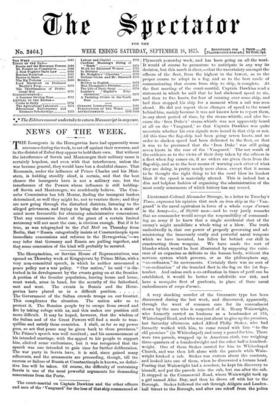Plymouth yesterday week, and has been going on all the
week. It would of course be premature to anticipate in any way its decision, but this much is clear,—that the uncertainty amongst the officers of the fleet, from the highest to the lowest, as to the proper course to adopt in a fog, and as to the best mode of communicating that course from ship to ship, is complete. At the first meeting of the court-martial, Captain Dawkins read a statement in which he said that he had slackened speed to six, and then to five knots, for fear of running over some ship, and had then stopped his ship for a moment when a sail was seen ahead. He did not report these changes of speed to the vessel behind him, mainly because it was not known how to report them, in any short period of time, by the steam-whistle, and also be- cause the Iron Duke's' steam-whistle was not apparently heard at all on the Vanguard,' so that Captain Dawkins was quite uncertain whether his own signals were heard in that ship or not. All this time the flag-ship had been going seven knots, and no order to slacken speed had been delivered to the fleet, so that it was to be presumed that the 'Iron Duke' was still going seven knots in the rear of the Vanguard.' The net result of the evidence as to the views of their duty taken by the officers in a fleet when fog comes on, if no orders are given them from the flag-ship, and as to the best means of warning each other of what they are doing, is pretty nearly mere chaos, except that it seems to be thought the right thing to let the cowl blow its loudest blast if the speed is materially altered. This is indeed but a dim and helpless fashion Of organising the administration of the most costly armaments of which history has any record.






























